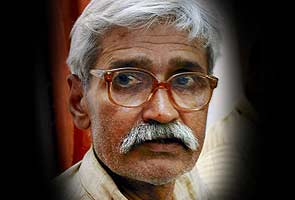Arrah, Bihar: There has been violence in several parts of Bihar after the murder of Brahmeshwar Singh or Mukhiya, who headed the banned, upper caste militia Ranvir Sena in the state. He was shot dead on Friday morning by unidentified people in the town of Arrah, which is now under curfew. The militia chief's supporters are not allowing the body to be moved,insisting that Chief Minister Nitish Kumar to visit first the murder site first.
A violent backlash that began in this part of north-western Bihar has now spread to other parts of the state. Mr Mukhiya's angry supporters have vandalized public property, burnt buses and set offices on fire, smashed windows of the Patna Rajdhani Express and they even heckled and pushed Bihar's police chief DGP Abhay Anand, when he visited Arrah. Mr Anand looked visibly ruffled. He announced that a police team had been set up, headed by a senior cop, to investigate the murder and that it would camp at Arrah till it solved the case. "It is an unfortunate incident, one that can cause tension and we will try to defuse the tension by finding the assailants," the top cop said.
The Chief Minister said the matter would be investigated as all such matters are."I appeal to people to maintain peace and to have patience. Proper investigation will be done and those responsible will be punished," Nitish Kumar said.
The Ranvir Sena's deadliest strike was in the Lakshmanpur Bathe area in 1997, in which 58 Dalits were killed.
Brahmeshwar Mukhiya was arrested in 2002 from Patna for the murders of 21 Dalits in a village in Bhojpur in 1996. The Sena chief spent nine years in jail. He was released on bail in 2011. Since then, he lived in his village in Bhojpur, maintaining a low profile. In April this year, the Patna High Court ruled that the prosecution had not been able to prove its case against him and others accused of the massacre.
Maintaining law and order after his murder will be a critical test for the administration of chief minister Nitish Kumar. When he was elected in 2005, one of Mr Kumar's promises was that he would rid Bihar of its cycle of caste-based violence. Through a strong police force and administrative reforms, he has been largely successful so far.
A violent backlash that began in this part of north-western Bihar has now spread to other parts of the state. Mr Mukhiya's angry supporters have vandalized public property, burnt buses and set offices on fire, smashed windows of the Patna Rajdhani Express and they even heckled and pushed Bihar's police chief DGP Abhay Anand, when he visited Arrah. Mr Anand looked visibly ruffled. He announced that a police team had been set up, headed by a senior cop, to investigate the murder and that it would camp at Arrah till it solved the case. "It is an unfortunate incident, one that can cause tension and we will try to defuse the tension by finding the assailants," the top cop said.
The Chief Minister said the matter would be investigated as all such matters are."I appeal to people to maintain peace and to have patience. Proper investigation will be done and those responsible will be punished," Nitish Kumar said.
In the 90's, the Ranvir Sena played a role in many of Bihar's infamous massacres which targeted 200 Dalits including women and children. The Sena or army was formed in 1992. Its victims were usually landless labourers and peasants. The Sena said it was committed to protecting the rights of farmers, and was avenging the murder of members of the upper caste, often land-owners, who were killed by the Naxals during their insurgency in Bihar in the 1980s and 90s.
The Ranvir Sena's deadliest strike was in the Lakshmanpur Bathe area in 1997, in which 58 Dalits were killed.
Brahmeshwar Mukhiya was arrested in 2002 from Patna for the murders of 21 Dalits in a village in Bhojpur in 1996. The Sena chief spent nine years in jail. He was released on bail in 2011. Since then, he lived in his village in Bhojpur, maintaining a low profile. In April this year, the Patna High Court ruled that the prosecution had not been able to prove its case against him and others accused of the massacre.
Maintaining law and order after his murder will be a critical test for the administration of chief minister Nitish Kumar. When he was elected in 2005, one of Mr Kumar's promises was that he would rid Bihar of its cycle of caste-based violence. Through a strong police force and administrative reforms, he has been largely successful so far.


No comments:
Post a Comment